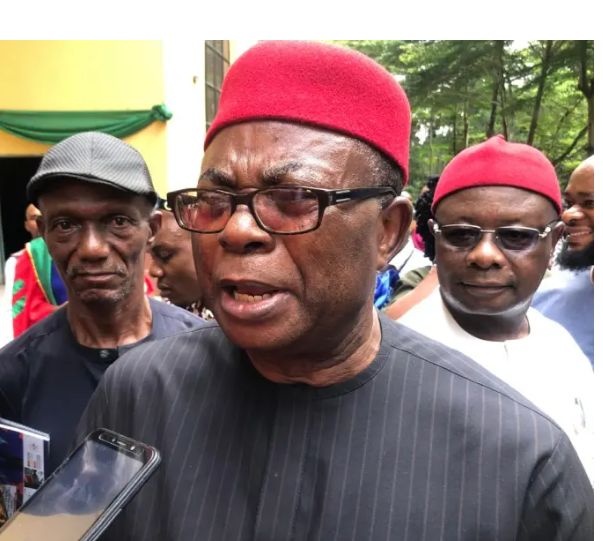*Calls for transparent use of taxes, allocations, IGR in states By;; OBINNA MOSES IBE, Umuahia The former member of House of Representatives
*Calls for transparent use of taxes, allocations, IGR in states
By;; OBINNA MOSES IBE, Umuahia
The former member of House of Representatives, Honourable Sam Ifeanyichukwu Onuigbo has extolled President Bola Ahmed Tinubu over new tax laws, while calling for transparent use of tax, allocation and internally generated revenues in the states in Nigeria.
Rep Onuigbo who was a two-time member of the Green Chambers having represented the good people of Umuahia North, Umuahia South and Ikwuano gave this commendation in an interview with journalists in the state, during the 62nd inaugural lecture of Micheal Okpara University of Agriculture, Umudike, held at Senator Anyim Pious Anyim Auditorium.
The Ikwuano born experienced politician who also is the member representing South East on the Governing Board of the North East Development Commission (NEDC)
commended President Bola Tinubu for signing into law the new tax reform, aimed at ending the burden of multiple taxation in Nigeria.
Onuigbo pointed out that the new tax law calls for the transparent and responsible use of tax revenues, internally generated revenues and allocations from the Federal government, urging state governments to key into the new reform, so as to end anomalies in the tax system.
He referenced the just concluded 62nd Inaugural Lecture of the Michael Okpara University of Agriculture Umudike (MOUAU), entitled, “Entropy of Injustice: A derivative of Thermodynamics in Tax Administration”, however described the lecture as apt and timely.
To this end,he explained that it coincided with the recent Tax Law of President Tinubu, which he said has the potentials to harmonize revenues for the benefit of the public.
Onuigbo popularly called Odozi Obodo by his numerous admirers further stressed that the new law, which takes effect from next year, would provide clarity, fairness, and transparency in the nation’s tax regime.
According to him, the reform would also allow those collecting taxes make sensible projections of what individuals and businesses would pay as their tax obligations without being harassed by arbitrary levies from left, right, centre.
“When you ensure that tax revenues are judiciously put to use, more citizens will be willing to comply and pay taxes,” Onuigbo said.
The NEDC representative further emphasized that Nigeria has entered a new phase where revenues from taxes, federal allocations, and internally Generated Revenue (IGR), must be deployed transparently and responsibly for the public good and urged State governments to embrace accountability and shun self-aggrandizement.
“This is what leadership is about, using resources for the welfare of the people, not for personal gain. President Tinubu’s advocacy is clear, taxes must serve the people”, he added.
Onuigbo also noted that the lecture where the new tax law was discussed was well attended, underscoring its importance in shaping Nigeria’s economic direction. He further expressed gratitude to the Federal government for the restoration of Management Courses at the Michael Okpara University of Agriculture Umudike (MOUAU), describing it as a milestone achievement.
He stressed that the reintroduction of these management courses have made the lecturers under the faculty more productive, stating that their lecture series have been instrumental in addressing national issues.
On his part,The Accounting and Taxation Professor , Michael Okpara University, Umudike,Professor John Uzoma Ihendinihu made case for tax justices in Nigeria,noting that radical tax reforms will end tax injustices suffered mostly by the poor masses of the society.
He pointed out that the tendency of tax systems to drift into disorder often results in tax injustice, where the poor bear a heavier burden while the rich exploit loopholes to gain more wealth.
To this end, erudite professor however outlined various dimensions of tax injustice, including, aggressive taxation, where low-income earners are compelled to pay taxes regardless of profit, while the wealthy evade their obligations, non provision of essential public good, a situation where tax revenues are used for self aggrandizement rather than public good, thereby, amounting to extortion.
According to Professor of Accounting,” multiple taxation, bribery and corruption, could led to erosion of public trust and tax evasion.
Prof Ihendinihu warned that tax injustice widens the gap between rich and poor, triggers social unrest, and builds a legacy of distrust in government and unfair tax policy.




COMMENTS